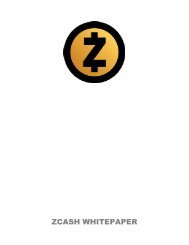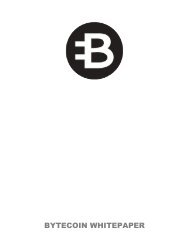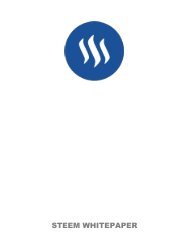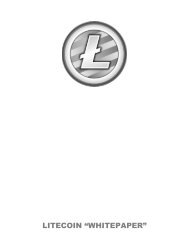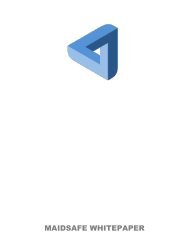Whitepaper - Ethereum Classic With Cover
You also want an ePaper? Increase the reach of your titles
YUMPU automatically turns print PDFs into web optimized ePapers that Google loves.
<strong>Ethereum</strong> <strong>Classic</strong> Documentation, Release 0.1<br />
contract Multiply7 {<br />
event Print(uint);<br />
function multiply(uint input) returns (uint) {<br />
Print(input * 7);<br />
return input * 7;<br />
}<br />
}<br />
The first thing to do is make sure the HTTP RPC interface is enabled. This means for geth we supply the --rpc<br />
flag on startup and for eth the -j flag. In this example we use the geth node on a private development chain. Using<br />
this approach we don’t need ether on the real network.<br />
> geth --rpc --dev --mine --minerthreads 1 --unlock 0 console 2>>geth.log<br />
This will start the HTTP RPC interface on http://localhost:8545.<br />
Note: geth supports CORS, see the --rpccorsdomain flag for more information.<br />
We can verify that the interface is running by retrieving the coinbase address and balance using curl. Please note<br />
that data in these examples will differ on your local node. If you want to try these command replace the request<br />
params accordingly.<br />
> curl --data '{"jsonrpc":"2.0","method":"eth_coinbase", "id":1}' localhost:8545<br />
{"id":1,"jsonrpc":"2.0","result":["0xeb85a5557e5bdc18ee1934a89d8bb402398ee26a"]}<br />
> curl --data '{"jsonrpc":"2.0","method":"eth_getBalance", "params": ["0xeb85a5557e5bdc18ee1934a89<br />
{"id":2,"jsonrpc":"2.0","result":"0x1639e49bba16280000"}<br />
Remember when we said that numbers are hex encoded? In this case the balance is returned in Wei as a hex string.<br />
If we want to have the balance in Ether as a number we can use web3 from the geth console.<br />
> web3.fromWei("0x1639e49bba16280000", "ether")<br />
"410"<br />
Now that we have some ether on our private development chain we can deploy the contract. The first step is to<br />
verify that the solidity compiler is available. We can retrieve available compilers using the eth_getCompilers<br />
RPC method.<br />
> curl --data '{"jsonrpc":"2.0","method": "eth_getCompilers", "id": 3}' localhost:8545<br />
{"id":3,"jsonrpc":"2.0","result":["Solidity"]}<br />
We can see that the solidity compiler is available. If it’s not available follow these instructions.<br />
The next step is to compile the Multiply7 contract to byte code that can be send to the EVM.<br />
> curl --data '{"jsonrpc":"2.0","method": "eth_compileSolidity", "params": ["contract Multiply7 {<br />
{"id":4,"jsonrpc":"2.0","result":{"Multiply7":{"code":"0x6060604052605f8060106000396000f3606060405<br />
Now that we have the compiled code we need to determine how much gas it costs to deploy it. The RPC interface<br />
has an eth_estimateGas method that will give us an estimate.<br />
> curl --data '{"jsonrpc":"2.0","method": "eth_estimateGas", "params": [{"from": "0xeb85a5557e5bdc<br />
{"id":5,"jsonrpc":"2.0","result":"0xb8a9"}<br />
And finally deploy the contract.<br />
> curl --data '{"jsonrpc":"2.0","method": "eth_sendTransaction", "params": [{"from": "0xeb85a5557e<br />
{"id":6,"jsonrpc":"2.0","result":"0x3a90b5face52c4c5f30d507ccf51b0209ca628c6824d0532bcd6283df7c08a<br />
The transaction is accepted by the node and a transaction hash is returned. We can use this hash to track the<br />
transaction.<br />
The next step is to determine the address where our contract is deployed. Each executed transaction will create<br />
a receipt. This receipt contains various information about the transaction such as in which block the transaction<br />
86 Chapter 1. Contents




